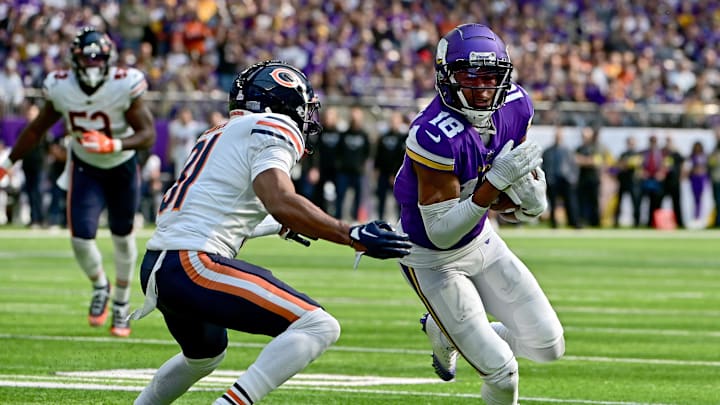Monday morning, the deal all of the NFL was waiting for finally went down. A Chicago Bears rival and one of the league's top stars, Justin Jefferson, agreed to a contract extension.
The Minnesota Vikings had been working with Jefferson to get a deal done for quite some time, now, and of course the purple and gold can finally breathe a sigh of relief.
The Bears, meanwhile, can look at a contract like this and feel pretty good about themselves.
A record deal: the Vikings and three-time Pro-Bowl WR Justin Jefferson reached agreement on a four-year, $140 million contract extension that includes $110 million guaranteed and makes him not only the highest-paid WR in NFL history, but the highest-paid non-QB in NFL history,… pic.twitter.com/OAESU3dOop
— Adam Schefter (@AdamSchefter) June 3, 2024
Just for comparison, D.J. Moore's cap number is just over $16 million in 2024, while Keenan Allen's is $23.1 million. So, the two Pro Bowl wideouts are going to count $39 million against the cap this coming season while Jefferson is making an average of $35 million annually.
Rookie Rome Odunze is also projected to get about $5.5 million annually on a 4-year deal, once signed.
Sure, Jefferson is arguably the best wide receiver in football. But, the Bears now have three top-tier wideouts on their roster, and defenses cannot put extra attention on all of them at once. That's where Chicago should be feeling mighty nice, right about now.
Justin Jefferson's new contract will impact the Bears' future, but not immediately
There is a reason the Bears didn't end up extending Allen's contract, and it's because of the Odunze pick. We can safely assume that Chicago will roll into 2025 with Moore and Odunze as their top two receivers, with Allen signing elsewhere as a free agent, barring Allen taking a steep discount to stay with the Bears.
Going into the final year of his deal in 2025, Moore may end up asking for an extension while the iron is hot. If that's the case, then he'll be justified in asking for far more than he's currently making on an annual basis. While Moore isn't at the level of Jefferson, he could very well get away with asking Chicago for somewhere in the range of $25-$30 million on an annual basis, now that the market has been reset.
The Bears will also have to think about a future extension for both Odunze and Caleb Williams, which might see the former earn somewhere between $20-$30 million annually and Williams' deal reaching even higher.
Will Chicago be able to invest that kind of money into two receivers and a quarterback in three years' time? Because that's the realistic timeline for all three of these players to wind up earning big money. Thanks to Jefferson resetting the market, teams like Chicago, with so much talent at wide receiver, could have some difficult decisions going forward. Hopefully, the cap continues to rise each year.
